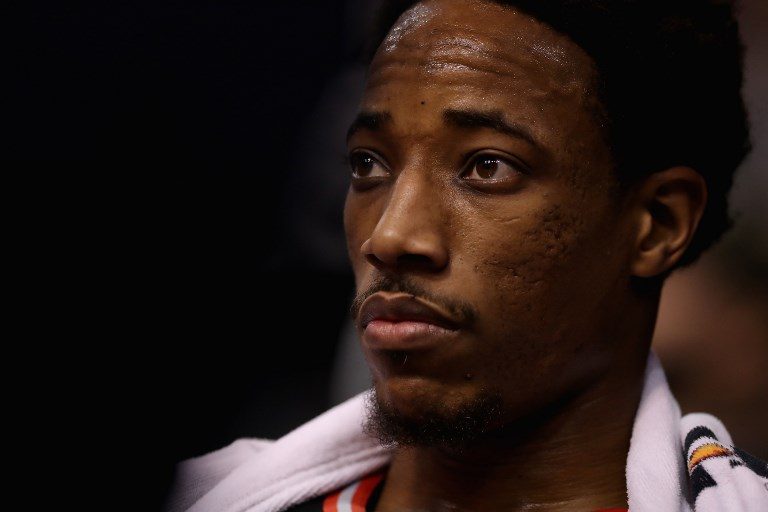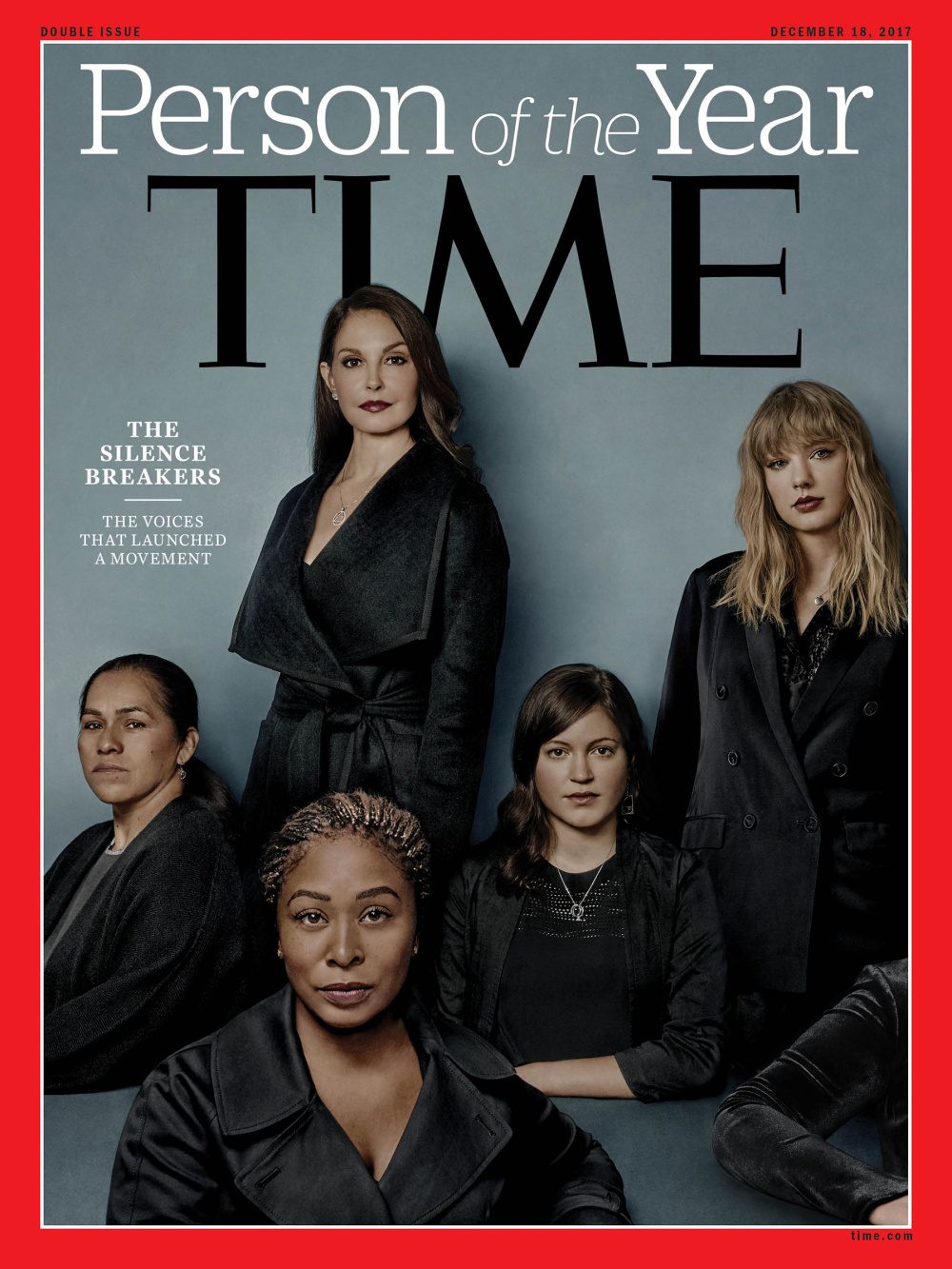SUMMARY
This is AI generated summarization, which may have errors. For context, always refer to the full article.

MANILA, Philippines – Last year, TIME Magazine unveiled a rather unique model for Person of the Year. It was a group of women, collectively called “The Silence Breakers,” who spoke up against widespread sexual abuses by mostly high-profile men. The initiative would soon be known as the #MeToo movement and eventually gave courage to more women opening up on more sexual violations done to them, especially at work. TIME’s photo would end up as the movement’s most iconic image.

The most powerful statement of the image, however, was not Taylor Swift, but rather the arm right below her. While it can seemingly be dismissed as a bad crop-out at first glance, it was actually meant to represent the women who have yet to speak up and ultimately says that yes, it’s okay to open up to the world.
Now, what does that have to do with sports and an all-male league like the NBA?
Last December 2014, former Milwaukee Bucks’ center Larry Sanders was deactivated from the roster due to “personal reasons.” It would take two whole months before Sanders revealed in The Players’ Tribune that he has committed himself to a rehabilitation center due to anxiety, depression and mood disorders. By then, he was already waived by the Bucks due to a second offense to marijuana possession. Sanders spent three years away from the NBA before deciding to return for the Cleveland Cavaliers. Unfortunately, he could no longer keep up with the daily grind as a pro ball player and was waived by the Cavs after just 5 games. To this day, he has not stepped back on an NBA court.
During that time, Sanders’ case was a unique one in a league of 450 men. Everyone else thought so. That is, until DeMar DeRozan spoke up just last week, three years after Sanders did.
Started with a tweet
A week before the highly-anticipated All-Star Weekend, a festive time where players unwind and have fun while still being the entertainers that they are, DeRozan tweeted some lyrics from “Tomorrow” by Kevin Gates:
This depression get the best of me…
— DeMar DeRozan (@DeMar_DeRozan) February 17, 2018
It would take more than a week before the 4-time All-Star opened up to Toronto-based news site The Star that he actually suffers from depression and anxiety.
“It’s one of them things that no matter how indestructible we look like we are, we’re all human at the end of the day,” he told The Star’s Doug Smith last February 26. “We all got feelings, all of that. Sometimes, it gets the best of you.”
Here was a 28-year old superstar multi-millionaire on top of the basketball food chain opening up that despite all the riches life has offered him, he struggles all the same like the man on the street. After all these years, it would seem that the Compton, California native has not yet escaped the nightmares of gang warfare and police brutality in the place he called home.
From Kelly, with Love
The basketball world would soon realize that DeRozan was not alone in his battle with mental illnesses, for on March 6, Cleveland Cavaliers star big man Kevin Love opened up as well and revealed that he suffers from panic attacks.
I’ve never been comfortable sharing much about myself. I thought about mental health as someone else’s problem. I’ve realized I need to change that. https://t.co/355HcQw3Ei
— Kevin Love (@kevinlove) March 6, 2018
In an article in The Players’ Tribune titled “Everyone Is Going Through Something,” Love detailed how he suffered from an attack in the middle of a game against the Atlanta Hawks last November 5, 2017.
“The air felt thick and heavy.”
“My mouth was like chalk.”
“I was freaking out.”
“I was just hoping my heart would stop racing.”
“It was like my body was trying to say to me, “You’re about to die.””
These were some of the symptoms Love felt before Cavaliers medical staff rushed him to the hospital after being found lying on the training room floor. It was the first time he had felt pain that had nothing to do with ACLs and ankles.
As Love put it in the Tribune, “For 29 years, I thought about mental health as someone else’s problem.”
#EveryoneIsGoingThroughSomethinghttps://t.co/355HcQesfI pic.twitter.com/EbPVlIRTw1
— Kevin Love (@kevinlove) March 8, 2018
Now, the 6-time All-Star is enjoining everyone to follow his path and speak up.
“Mental health isn’t just an athlete thing,” he said. “What you do for a living doesn’t have to define who you are. This is an everyone thing. No matter what our circumstances, we’re all carrying around things that hurt — and they can hurt us if we keep them buried inside.”
And speak up, they did.
Just two days later, Kelly Oubre of the Washington Wizards revealed to NBC Sports Washington that he too, suffered from mental issues. “We’re normal human beings,” the 22-year old forward said. “We face a lot more adversity, and a lot more problems and struggles as a normal human being.”
“Nobody sees that I’m weak, but deep down inside, I am going through a lot, and hell is turning over,” he added. “I just go in a quiet place and breathe, man.”
The problem of the “man up” attitude
In the wake of all these admissions, DeRozan, Love and Oubre were met with overwhelming praise and support from the NBA community.
“[LeBron James] shook my hand and said, “You helped a lot of people today,” Love shared with Joe Vardon of Cleveland.com. DeRozan told USA Today that he himself has received an “outpouring of support and gratitude” from fans.
Larry Sanders opened up years ago and got the same outpouring of support, so why did all these players wait so long to open up themselves?
Looking at the confessions, a common denominator stands out: They were expected to be “a man.”
“Growing up, you figure out really quickly how a boy is supposed to act,” said Love. “You learn what it takes to ‘be a man.’ It’s like a playbook: Be strong. Don’t talk about your feelings. Get through it on your own. So for 29 years of my life, I followed that playbook.”
“These values about men and toughness are so ordinary that they’re everywhere … and invisible at the same time, surrounding us like air or water,” he added. “They’re a lot like depression or anxiety in that way.”
Oubre shared the exact same teaching coming from his own family.
“I’m really good at keeping a poker face because when I was growing up, my dad always told me, ‘Don’t let anybody see you weak.’”
Even DeRozan, whose mother taught him that one never knows what another is going through, took decades before opening up.
“My mom always told me: Never make fun of anybody because you never know what that person is going through. Ever since I was a kid, I never did. I never did. I don’t care what shape, form, ethnicity, nothing. I treat everybody the same. You never know.”
This mentality is especially reinforced in the NBA – a league for the tallest, fastest and strongest athletes in the world. Pain is weakness, and the weak are weeded out. In a league of trash-talk, poster dunks and world-class competition, there is simply no time to think about pain.
The arm cropped out
DeRozan changed all that with a single tweet.
“Without a guy like DeMar DeRozan coming out and speaking about mental health, I probably wouldn’t have pressed ‘send’ yesterday,” Love said. “Just open the door for other athletes and people of power, influential people, just to speak out about this topic because it is so prevalent and really looks like it was needed.”
“We need to beat down that stigma about mental health and need to be able to come out and talk things out,” he concluded.
Like the cropped-out arm in the TIME photo, DeRozan in his own way, became the next person up. He became the leader that his basketball brothers needed – their fraternity’s own Silence Breaker.
And like the photo suggested, there is always someone next to speak, someone to break reinforced stereotypes and make others realize that the world is not as unforgiving as the rest would want them to think. That speaking up does not make one less of a man, but rather makes him more of one.
DeMar DeRozan has yet to win an NBA title, but to eyes of his peers and everyone around him, he’s already a champion in his own right. – Rappler.com
Add a comment
How does this make you feel?





There are no comments yet. Add your comment to start the conversation.